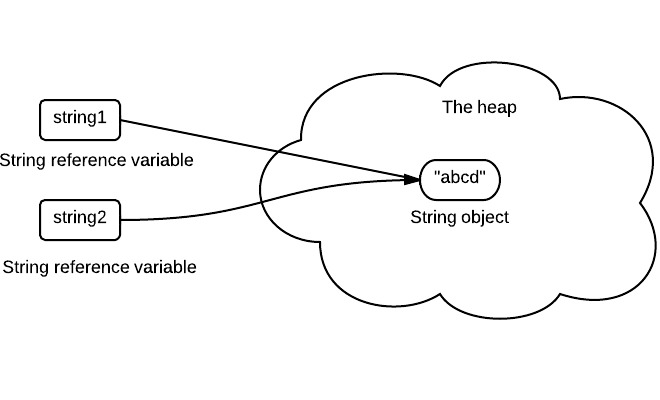Why Are Strings Immutable in Java? Ideal Practices and Usage Situations
Why Are Strings Immutable in Java? Ideal Practices and Usage Situations
Blog Article
Exploring the Advantages of Unalterable Strings in Modern Programs Paradigms
In the world of contemporary shows standards, the principle of unalterable strings stands as a foundation of durable software growth. By embracing unalterable strings, designers can make certain improved data integrity, improved thread safety, streamlined debugging processes, increased protection steps, and reliable performance optimization.
Improved Information Integrity

By preventing the alteration of string objects, immutability gets rid of the danger of unintentional modifications to the data they hold. This not just boosts the protection of the details but additionally enhances the dependability of the code that depends on these strings.
Immutability additionally supports more secure multithreading atmospheres, as concurrent access to immutable strings does not posture the risk of information corruption with synchronised modifications. This residential property streamlines the procedure of taking care of strings in identical programming scenarios.
Essentially, immutability serves as a safety shield around the information stored within strings, boosting their stability by making sure that when specified, their values stay unmodified throughout the program's execution.

Boosted Thread Security
Unalterable strings improve the thread safety of programs by guaranteeing that when a string object is produced, its worth can not be changed. This home gets rid of the threat of concurrent threads attempting to modify the very same string concurrently, which might lead to data corruption or inconsistent states in the program - Why are strings immutable in Java?. In a multi-threaded environment, where several threads gain access to and control data concurrently, the immutability of strings gives a level of safety by guaranteeing that the information stays the same throughout its lifecycle
Simplified Debugging Procedures
Offered the improved string safety promoted by unalterable strings, a considerable benefit emerges in the realm of simplified debugging processes. Immutable strings, once produced, can not be modified, making it easier to map the flow of data and identify the source of insects in a program. This immutability makes sure that strings stay consistent throughout the execution of the program, decreasing the probability of unexpected adjustments that can lead to mistakes.
When debugging with mutable strings, designers commonly experience issues where a string's value is changed accidentally, making it testing to pinpoint the source of an insect. However, with immutable strings, the information stays unchanged, allowing developers to concentrate on assessing the real logic of the code rather than finding where and when a string was customized inaccurately.
In addition, immutable strings simplify the debugging process by making it possible for much easier recreation of bugs. Because immutable strings do not change state, designers can recreate and examine insects better, leading to quicker identification and resolution of concerns within the codebase. This streamlined debugging workflow ultimately adds to higher software program quality and boosted general advancement efficiency.

Enhanced Protection Steps
Enhancing information defense and fortifying system honesty, the use of immutable strings in software application applications adds considerably to increased safety and security steps. Unalterable strings also play an important function in protecting against common safety susceptabilities such as buffer overflows and SQL injection assaults, as efforts to adjust string data at runtime are naturally restricted.
Moreover, the immutability of strings improves the predictability of program actions, from this source making it easier to verify inputs and protect against unanticipated adjustments that might endanger safety. This predictability simplifies the procedure of bookkeeping and confirming code, allowing developers to recognize prospective security technicalities extra efficiently. In general, integrating immutable strings right into software program growth practices not only enhances the effectiveness and dependability of this website applications but additionally strengthens their strength versus protection threats.
Efficient Performance Optimization
Building upon the foundation of enhanced safety and security steps attained via the use of unalterable strings, a crucial element to think about in software program growth is effective efficiency optimization. When dealing with mutable strings, procedures like concatenation or substring production usually cause the production of brand-new string things, resulting in memory overhead and increased handling time. Nonetheless, with unalterable strings, these operations can be maximized to boost performance. By enabling strings to stay constant and stable, unalterable strings promote much better memory administration and caching chances, eventually increasing the total performance of the software application.
Immutable strings likewise play an important role in multithreaded environments by promoting string security. Why are strings immutable in Java?. Given that immutable strings can not be changed once created, they can be shared throughout strings without the threat of unanticipated modifications, decreasing the need for synchronization devices and improving concurrency. Moreover, immutable strings streamline debugging processes as developers can rely on that a string's worth will remain consistent throughout the program's implementation, eliminating potential errors brought on by mutable state changes. Finally, making use of immutable strings not just enhances safety however also considerably adds to the reliable efficiency optimization of modern software program systems.
Verdict
Finally, the benefits of making use of unalterable strings in modern programs standards can not be overstated. Enhanced data integrity, boosted string safety and security, streamlined debugging processes, enhanced safety and security steps, and efficient efficiency optimization all add to the total performance of shows tasks. By incorporating immutable strings right into programs techniques, designers can take advantage of an extra robust and reputable codebase.
Immutability, a crucial feature of strings in shows languages such as Java and Python, ensures that that site as soon as a string object is created, it can not be modified or modified.Unalterable strings boost the thread safety and security of programs by making certain that as soon as a string things is developed, its value can not be modified. Immutable strings additionally play a crucial function in avoiding usual security vulnerabilities such as buffer overflows and SQL shot assaults, as attempts to adjust string information at runtime are inherently limited.
By enabling strings to stay unchangeable and continuous, immutable strings facilitate better memory monitoring and caching chances, eventually increasing the overall performance of the software program.
Immutable strings streamline debugging processes as programmers can trust that a string's value will certainly stay consistent throughout the program's implementation, eliminating prospective mistakes triggered by mutable state changes.
Report this page